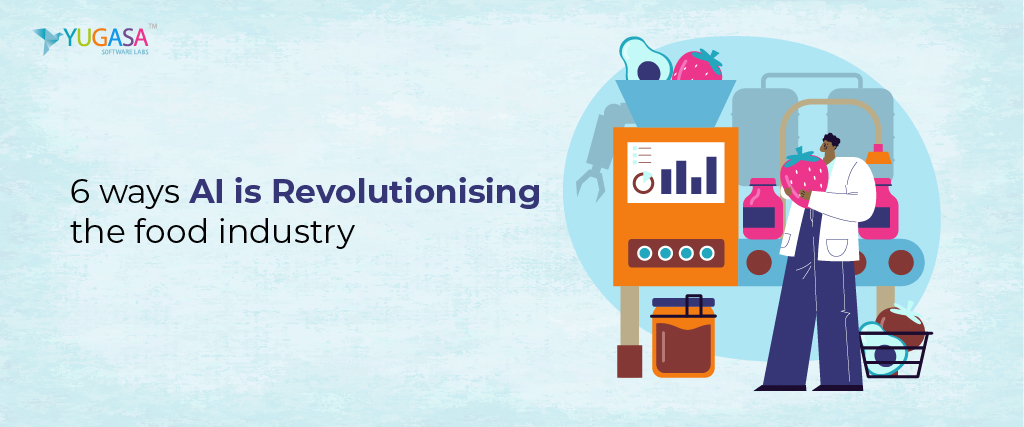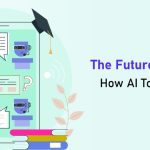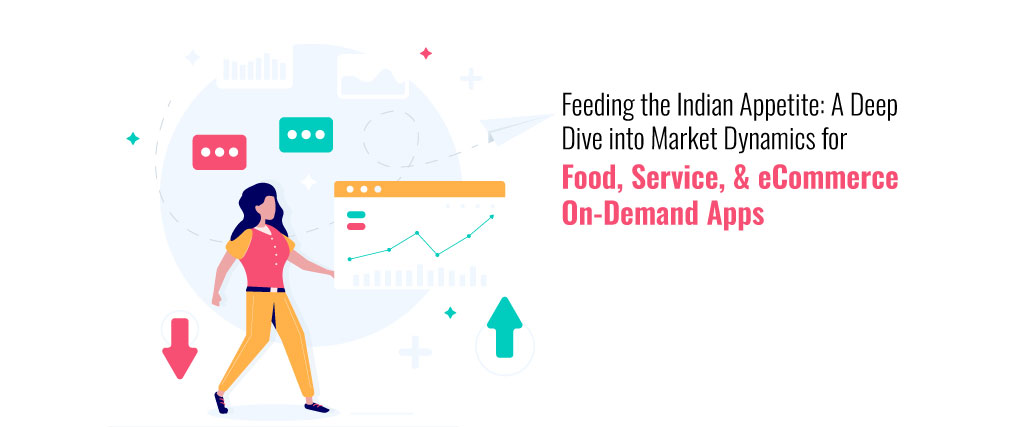Artificial Intelligence (AI) technology has brought about a paradigm shift in the food business in recent years.
AI is completely changing the way we grow, prepare, and eat food, from farm to fork.
This shift is improving accuracy and efficiency while creating new opportunities for creativity in the food industry.
This blog will discuss the different applications of AI in the food sector, including the automation of food processing and its wider effects on food production.
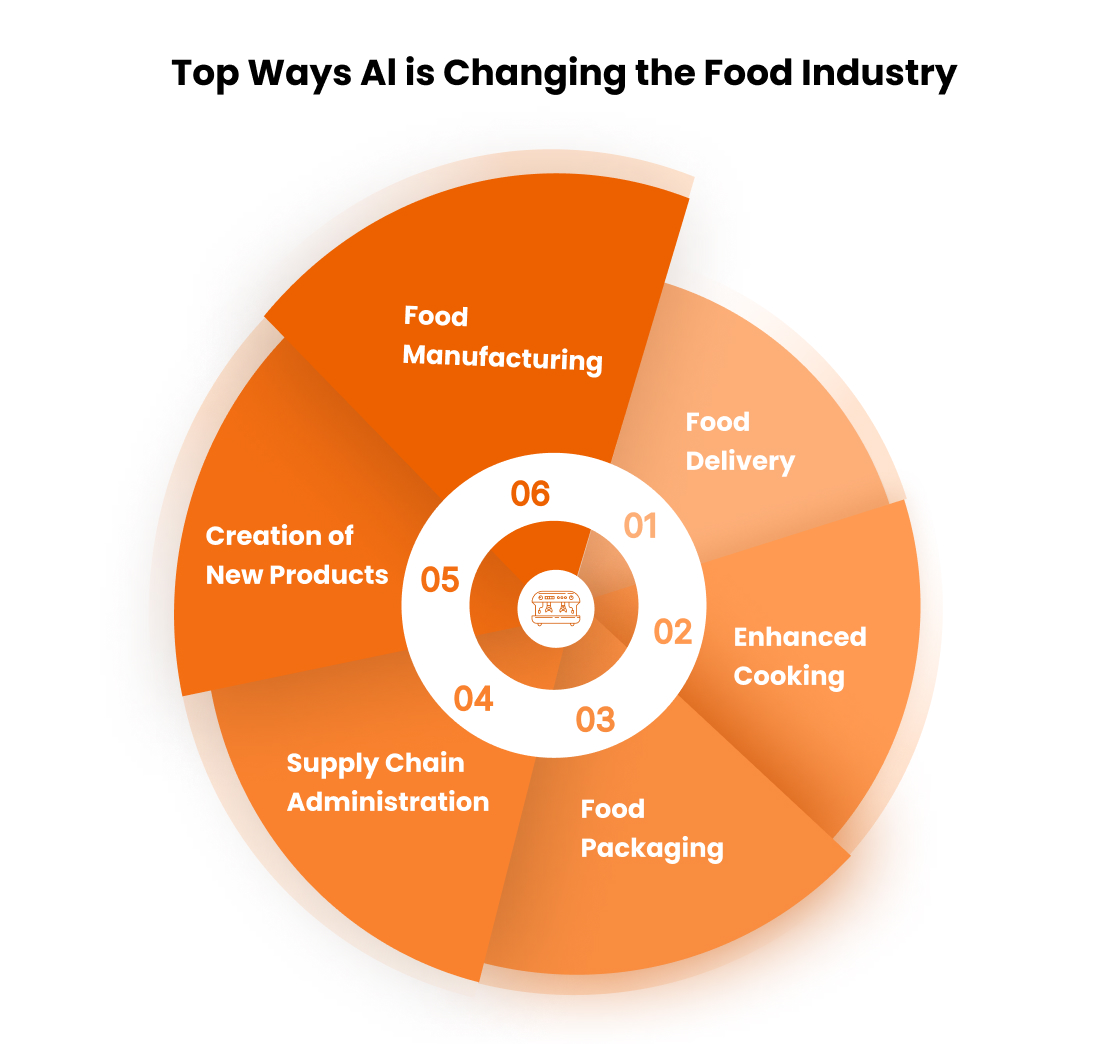
-
Enhanced Efficiency in Food Processing:
Artificial intelligence has revolutionized conventional production processes in the food processing industry, ushering in a new era of efficiency.
Artificial intelligence (AI)-powered automated systems are becoming essential for managing complex jobs like sorting, packing, and quality assurance.
These technologies drastically cut manufacturing times and costs because they work with unparalleled speed and accuracy.
The application of AI guarantees a consistent output of food goods of the highest quality while also streamlining procedures.
Human labor can be diverted to more intricate and creative parts of the food manufacturing process by automating
repetitive jobs, which will promote innovation and the progress of the industry as a whole.
-
Quality Control and Assurance:
Artificial Intelligence (AI), especially through machine learning algorithms, has become a vital tool in the quality control domain for maintaining and improving food product standards.
These algorithms detect possible flaws, irregularities, or deviations in the production process by analyzing large datasets in real time.
Artificial Intelligence helps reduce the likelihood that consumers will receive subpar items by offering proactive detection and quick response mechanisms.
By ensuring that consumers can trust the quality and safety of the products they buy, this not only protects the reputation of food brands but also lessens the need for recalls and strengthens consumer loyalty to the brand.
-
Personalized Nutrition and Dietary Recommendations:
Artificial intelligence is changing how people approach their diets by providing individualized dietary suggestions.
To deliver individualized nutrition advice, AI-driven systems and apps use data on food choices, constraints, and individual health profiles.
With this degree of customisation, customers are empowered to choose foods that are healthier and more suited to their individual needs.
This offers the food sector a chance to develop and promote goods that meet certain dietary needs, reaching out to an expanding consumer base of health-conscious people looking for customized solutions.
-
Supply Chain Optimization with Predictive Analytics:
A notable breakthrough has been made with the application of AI to supply chain management, especially with the use of predictive analytics.
In order to predict changes in demand, manage inventory levels, and expedite distribution procedures, artificial intelligence (AI) systems examine past data, market trends, and other pertinent variables.
By ensuring that production closely matches real demand, this eliminates food waste in addition to lowering operating expenses.
As a result, the supply chain is more adaptable and effective, improving sustainability by lessening the negative environmental effects of excess production and inefficient distribution methods.
The food sector will become more resilient and environmentally benign as a result of this technological and logistical convergence.
-
Culinary Creativity and Recipe Generation:
Artificial intelligence is promoting creativity in the kitchen itself, even outside of production facilities.
Large databases of recipes, ingredients, and flavor profiles can now be analyzed by sophisticated computers, which makes it possible to create original and creative recipe ideas.
Professional and amateur chefs alike can use AI as a tool to push the boundaries of conventional cooking methods, discover new flavors, and discover uncharted culinary territories.
This fusion of machine-generated inspiration and human skill not only inspires creativity but also creates opportunities for the development of whole new culinary experiences.
AI is a driving force behind culinary innovation, inspiring cooks to defy expectations and provide novel flavors and textures to the food industry.
-
Improved Customer Experience:
AI is proving to be a crucial factor in improving the food industry’s entire customer experience.
Artificial Intelligence (AI)-driven chatbots and virtual assistants are becoming more commonplace in enabling smooth customer interactions. These
AI-powered interfaces help customers in real-time by providing tailored recommendations, responding to their questions, and streamlining the purchase process.
This not only makes operations for businesses more efficient, but it also gives customers a more engaging and effective experience.
Artificial Intelligence (AI) enhances consumer happiness and loyalty by customizing interactions to individual tastes and needs.
This, in turn, shapes a more customer-centric food business that places a premium on user ease and customization.
There is enormous potential for the food business to see increasingly more advanced and naturalistic client interactions as AI develops.
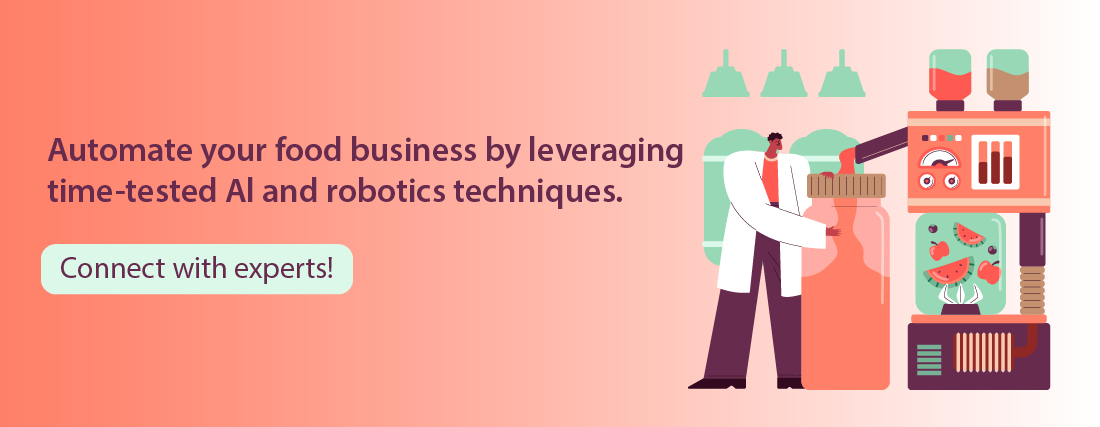
FAQs
-
How does AI enhance efficiency in food processing?
AI increases the efficiency of food production through automation. Intelligent machines driven by artificial intelligence (AI) can perform tasks like packaging, quality checking, and sorting fast and accurately, reducing production delays and costs.
Automation also fosters innovation by freeing up human labor to focus on more complex aspects of the industrial process.
-
How might AI aid in quality control in the food industry?
Artificial intelligence (AI), particularly machine learning algorithms, assists with quality control by immediately analyzing large datasets.
This makes it possible to proactively discover defects or anomalies in the production line, which lowers the likelihood that customers will receive inferior products and ensures the maintenance of high standards of quality.
-
Is it possible for AI to offer individualized food recommendations?
Yes, through the analysis of individual health profiles, dietary preferences, and constraints, AI-driven applications and platforms are able to offer personalized nutrition recommendations.
Customers are empowered to make knowledgeable, healthful food decisions based on their own needs thanks to this degree of personalization.
Final thoughts
In summary, the food sector has entered a new era of efficiency, innovation, and customer-centricity with the introduction of artificial intelligence.
The applications and advantages of AI are wide-ranging and significant, ranging from improving quality control and expediting production processes to fostering culinary innovation and offering individualized dietary recommendations.
Using these technologies is not only a matter of choice for companies looking to maintain relevance and competitiveness in a market that is changing quickly.
The future is not just about what’s on our plates; it’s how AI can assist us create a more sustainable, effective, and delightful dining experience. Come along for the revolution now!


